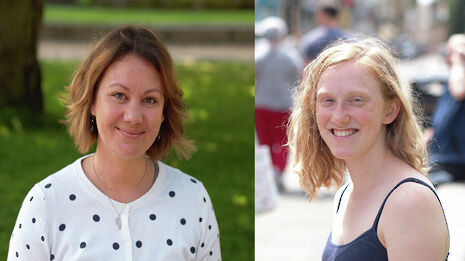Juggling babies and a bachelor’s
Stephanie Stacey finds out more about the trials of living as a full-time student and a full-time parent

Being both a student and a parent is “a culture clash”, according to Megan Goldman-Roberts, a former Natural Sciences undergraduate at Newnham College currently undertaking a PGCE qualification.
Stereotypically, deadlines are the principal cause of stress for most Cambridge students, but for those with children, priorities must be shifted, with added obligations and, for some, a sense of guilt when forced to sacrifice time with their kids in favour of academic work. Speaking of trying to find a balance between studying and caring for her two sons, PhD student Olivia Slater said, “my time is simply not my own”.
Olivia’s path to studying for a PhD at Cambridge is far from typical, not least because she dropped out of school at 15. Beginning her undergraduate degree in Australia as a married mature student with a young son, she has never had the experience of ‘typical student life’, saying that she, for example, didn’t go on pub crawls in freshers week.
Olivia’s PhD is focused on the presence and influence of Indigenous Australian theatre in Australian high schools, a subject of particular personal interest for her, a self-confessed “theatre nerd” and the first Aboriginal Australian woman to do a PhD at Cambridge.
The collegiate system, as well as significant division between faculties, particularly at the postgraduate level, can lead parents like Olivia to become isolated. With student parents scattered across different corners of the University, it can be difficult to find others in a similar situation. “My children often say to me, ‘Mum, why don’t we know more people with kids?’ and I say, I don’t know, I’m trying! I don’t know where everyone is hiding!”
“Early parenthood is an entirely different beast to raising school age children”
Although praising the University’s efforts to establish supportive spaces for student parents to meet and interact, Olivia said that the majority of these initiatives fail to suit her personal situation. She noted, for example, that as a parent of slightly older children, the timing of the weekly graduate student parent’s morning coincides with a school-day, leaving her and her kids unable to attend. The spontaneity, too, of University life can create barriers for student parents seeking to form friendships with their childless peers. Fast-paced, last minute decisions cannot easily correspond to childcare schedules and fixed school collection times, while typical student nightlife is often incompatible with kids’ bedtimes.
Despite these challenges, student parents certainly are able to find friends, even if the process may take longer. After almost two years in Cambridge, “we’ve built a little family here”, Olivia said, adding that her children call some of her friends auntie and uncle. Unexpected crises are an occupational hazard of raising children: illness, accidents, trouble at school. A broken arm, for example, takes precedence over a supervision, meaning both student parents and their academic supervisors must be flexible.
“I make a terrible analogy of being a really great juggler and throwing five balls, but then someone throws a knife at you, and you just have to drop everything to catch the knife.”
Support from academic advisors and supervisors is vital to the welfare of all students, but particularly for those who, like student parents, are already stretched. For Olivia, the fact that her PhD supervisor offered “permission to slow down to whatever pace [she] needed right from the beginning” was “very freeing”.
“I don’t think there’s a perfect way to live a life. I don’t believe in a timeframe”
Olivia credits her husband for his support, and the efforts he has made as principal carer for their children during her most intense academic periods, saying “I can’t imagine the kind of stress and isolation you would feel as a single parent.” According to Megan Goldman-Roberts, it was “stubbornness” that enabled her to complete a Natural Sciences degree whilst caring for a young child as a single student parent.
While many of us have stayed awake long enough to see the sunrise in a caffeine-fuelled essay or problem-sheet panic, children can often cause unplanned all-nighters. Speaking of her experiences as a student parent, Megan said “you learn to juggle”, but added that tiredness played a large role in her undergraduate life. She was “fortunate” that her dad was able to visit for several days a couple of times each term, offering “much-needed” opportunities to rest. Her friends, too, became vital lifelines.
While an undergraduate, Megan was CUSU’s student parent representative, a position she herself established and which is now unfilled. Like Olivia, she spoke of the inaccessibility of some of Cambridge’s student parent initiatives and groups, adding that many of the meet-ups and support systems are arranged by already-overstretched students, with few full-time members of staff hired by the University.
Financially, there are many sources of support for undergraduate student parents, with several University-administered bursaries, government grants, and the opportunity to have independent status when assessed for a student loan. This means the income of their family members will not be taken into account, allowing access to a higher maintenance loan. Welfare however, is more difficult to support, with student parents a “minority group”, all of whom have very variable needs. “Early parenthood is an entirely different beast to raising school age children”, Olivia said.
For Megan, the most crucial improvement required to enhance access and welfare for student parents is “greater clarity”, saying that the already present support must be made “more obvious”. In order to remedy the divisions created by the collegiate system, she called for “more centrally run events” and also emphasised the need to openly acknowledge accessibility, saying that simply tagging on “children welcome” to an event invitation can go a long way in making student parents feel accepted.
Although acknowledging the added challenges presented by student parenthood, Megan tells me that her son offers motivation for studying, a constant reminder that she is working to create a better future for them both. Olivia echoed this sentiment, adding, “I don’t think there’s a perfect way to live a life. I don’t believe in a timeframe - the perfect time to have kids or to study. I just think you should take opportunities where you can.”
 News / Cambridge and Manchester Universities meet for innovation partnership26 February 2026
News / Cambridge and Manchester Universities meet for innovation partnership26 February 2026 News / Private school teacher who lied about Cambridge degree barred from teaching27 February 2026
News / Private school teacher who lied about Cambridge degree barred from teaching27 February 2026 News / Cambridge academics sign open letter criticising research funding changes22 February 2026
News / Cambridge academics sign open letter criticising research funding changes22 February 2026 News / Judge Business School advisor resigns over Epstein and Andrew links18 February 2026
News / Judge Business School advisor resigns over Epstein and Andrew links18 February 2026 Theatre / The Memory of Water is dazzlingly well done27 February 2026
Theatre / The Memory of Water is dazzlingly well done27 February 2026










![How to Create an Attractive Freelancer Portfolio [5 Tips & Examples]](https://www.varsity.co.uk/images/dyn/ecms/320/180/2026/02/vitaly-gariev-ho2tNOWZYXM-unsplash-scaled.jpg)